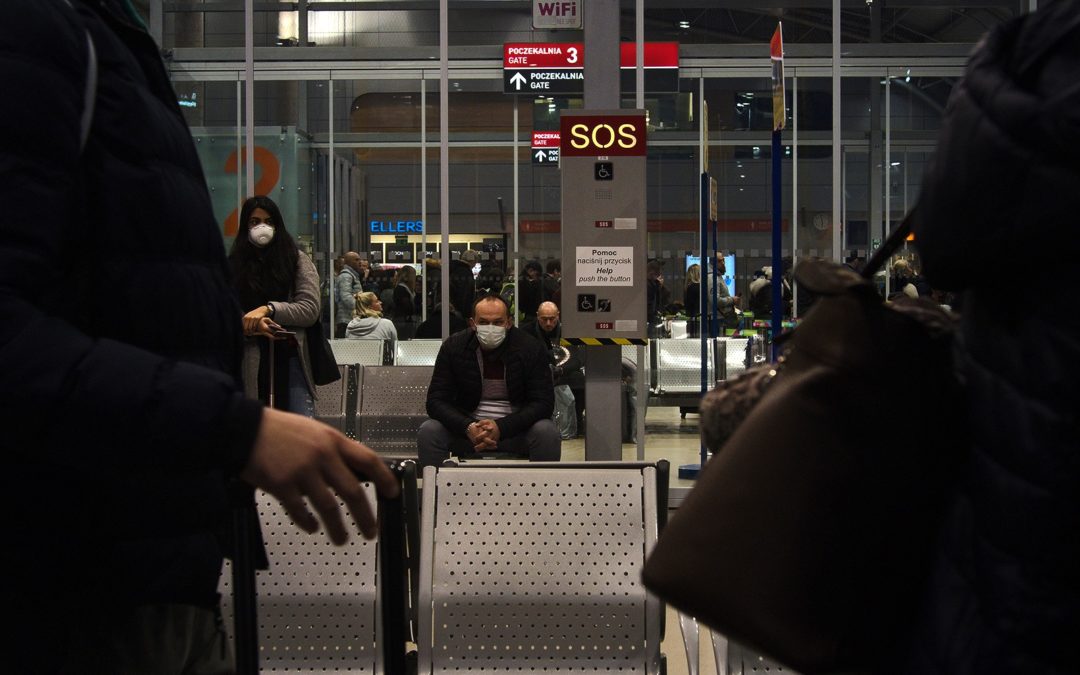By Percy Metcalfe
As Poland takes increasingly restrictive measures to control the effects of the COVID-19 pandemic, international students and researchers are being faced with difficult decisions: whether to stay or to go home being just the first.
On 10 March, the rectors of Poland’s two highest-ranking universities, the University of Warsaw and Jagiellonian University in Kraków, both announced the cancellation of all lectures and other in-person activities. With more than 8,000 international and exchange students between them, these two institutions represent the largest hubs for foreigners residing in Poland for academic purposes. Other universities across the country soon followed suit, as the country went into shutdown.
Prior to the crisis caused by the novel coronavirus, Poland was host to around 85,000 foreign students at its higher education institutions. As the country’s largest immigrant group, Ukrainian students are the most numerous, though Poland’s participation in the Erasmus programme since 1997 has also made it an increasingly popular destination for European citizens from across the continent.
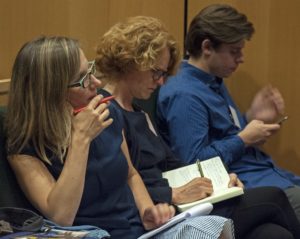
Dr Karolina Czerska-Shaw, left (photo: Adelina Krupski)
Dr Karolina Czerska-Shaw is an assistant professor at the Institute of European Studies at Jagiellonian, where she also acts as an Erasmus Mundus coordinator for the Euroculture MA Programme. The long and short-term academic mobility at the heart of the Mundus scheme “has abruptly come to a halt,” she notes, which for international students threatens “the very essence of their experience”.
Many international students found their grants cut, essentially forcing them to go home. Czerska-Shaw says that university teaching staff and administrators have needed to adapt quickly to “using all the tools that are available” to support both international students who remained in Poland and those who left.
Igor Nowicki, a 17-year-old Ukrainian in his first year at the University of Warsaw, was taken by surprise by Poland’s rapid and decisive response to the evolving COVID-19 pandemic. Until that moment, Nowicki had largely considered the outbreak a source of humour. He was bemused when his brother, also a student, with whom he shares a flat, began stockpiling soap shortly after the Christmas break.
“It’s just in China,” he thought, “it’s not going to affect us.”
When the University of Warsaw announced its closure, Nowicki weighed up his options: “I was in a pretty good position in Poland, with my own flat with my brother. It wasn’t like we had to leave immediately because we are living in dorms with tons of kids. But at home we are close to our family and if something happens we can be there.”
The brothers stocked up on food in preparation for a long stay in their apartment in Warsaw, but soon changed their minds when they heard the borders might close, quickly booking tickets on a train to Kyiv. Worried about infection, they secured an entire compartment to themselves for the journey.
Nowicki was surprised by the lack of controls once they arrived in Ukraine: “They just took our temperature and said ‘OK, you can go.’” As returnees from abroad, he expected some form of check-ups, tests, or enforced quarantine. Instead, it was left up to them to decide how to act. Luckily, they had taken all the food they had purchased in Warsaw, so were prepared to stay inside for the recommended 14 days in an empty apartment in the capital, owned by their parents. Only after this period of isolation do the brothers plan to rejoin their family in their hometown of Chernihiv.
Reflecting on his decision to leave Poland, Nowicki admits that he worries about the state of healthcare in his home country. He estimates that the outbreak will be worse in Ukraine than in more developed Poland, but he is taking the only course of action he can in these uncertain times, “I’m hoping that I’m not infected and after four more days I can go to my family. Everyone will stay inside.”
Other international students, with more intimate knowledge of how healthcare systems are likely to be strained by the pandemic, based their decision to stay or go on a different set of factors. Vilde Strøm, a Norwegian medical student in her final year at the Jagiellonian University, heeded the call from her government to return home and “report for duty” at her local hospital in Skien, southwest of Oslo.
It was not an easy choice for her, however. After more than five years as a student in Poland, it also felt like home to her. Friends, an apartment, and a long-term boyfriend, Adam, all pulled her to remain, though ultimately her family’s pleas, her desire to assist the country that had paid for her medical education, and her confidence in the Norwegian health system won out. After an evening of fraught negotiations with Adam, they decided to board one of the last planes out of Warsaw.
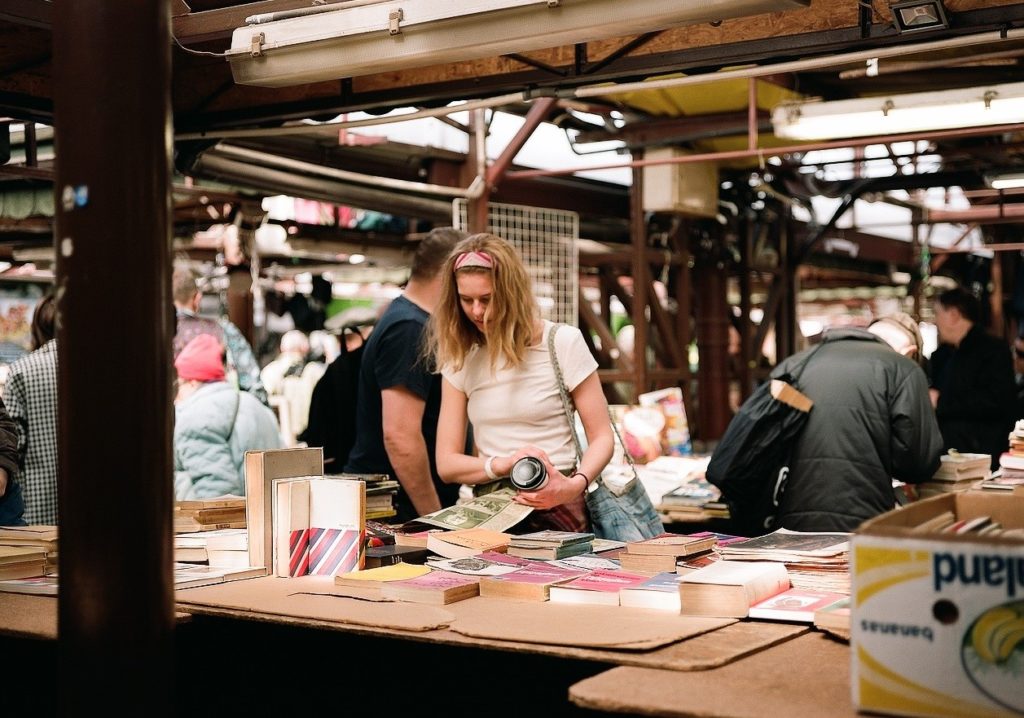
Vilde Strøm during her time in Poland (photo: Adam Schorin)
At the airport, Strøm noted how “the atmosphere felt thick with everyone’s fears of not being able to board the flights, due to new and sudden restrictions”. Adam was pulled aside as he lacked Norwegian documentation, but was ultimately allowed to pass after proving that he would have a place to spend a 14-day mandatory quarantine.
“We’ve been here for over a week now. I feel very back and forth on whether it was good that we came or if we should have stayed,” Strøm told Notes from Poland from her family’s home in Skien, “I’m mostly glad we are here. I feel comforted that at least some things stay the same when it feels like the world is coming to an end.”
Strøm had a remote job interview for her local hospital recently. The general line of questioning was: “How soon can you start?”
Maryellen Zbrozek, an American student who has been teaching English at the University of Science and Technology in Bydgoszcz as part of the US government-sponsored Fulbright Program since September, has been forced to reckon with her own immunocompromised status since the threat of COVID-19 became a daily reality. Zbrozek receives bimonthly infusions of Infliximab at hospital to manage her case of Crohn’s disease, an autoimmune condition that puts her at higher risk for infection and serious illness should she come into contact with a viral carrier.
The Michigan native realised the gravity of the situation before most. In late February she cancelled a trip to Barcelona, scheduled for April. As the pandemic crisis developed, Zbrozek watched with alarm as it encroached further into her life. Her dormitory in Bydgoszcz was closed, along with the rest of the university, so she was forced to move in with her boyfriend in Kraków, where she continues to teach online.
There, at least, she could rely on others to deliver food and could avoid public transport altogether. The US State Department continues to urge her and other Fulbright grantees to leave Poland on embassy-organised flights, although Zbrozek has so far resisted.

Maryellen Zbrozek in Gdańsk
“Travelling overseas is the least safe option for my health at this time,” she said. “I feel safer in Poland than I do in the US. I have not been impressed by the approach the US government has taken to tackle this epidemic, whereas I feel that Poland took drastic measures very early on.”
Zbrozek remarked on the support she has received from the Polish Fulbright Commission in Warsaw, who have worked tirelessly to ensure her visa continues to allow her to stay in the country. She notes, “I would like to receive the same level of care and compassion from the US government. I do not feel safe putting myself and my family at risk by travelling home.”
International travel certainly carries risks in these unusual times. For many, though, the fear of being isolated away from family, in cramped halls of residence, led to hasty departures from Poland. Andie Cooper, an Irish Erasmus student at the University of Warsaw, decided against staying, despite the higher number of cases back home.
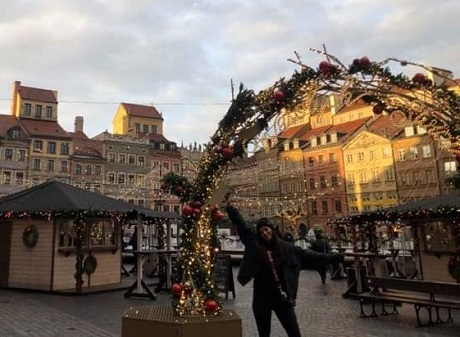
Andie Cooper in Warsaw
“The biggest factor for me in this process was the security of being at home in a world of uncertainties at present,” she said. “My family also played a massive part, as there was the concern that I would be separated from them for an extended period of time, during which any one of us could fall ill.”
Those who left early enough, like Cooper, were able to get onto the few remaining flights out of the country. Those who waited, however, had to navigate mass cancellations and crowded airports, which encouraged the spread of the virus.
Some international students at Polish institutions have even confirmed that they contracted the virus after travelling home to be closer to family.
Anne Neijens, a masters candidate in management at Kozminski University in Warsaw, was in Spain when she realised how serious the pandemic would become for European countries. Already feeling a little unwell, but thinking nothing of it, she organised flights home to Belgium via Warsaw, so she could pack up some possessions. After several days in Belgium with worsening symptoms of COVID-19, Neijens was finally referred to a hospital for testing.
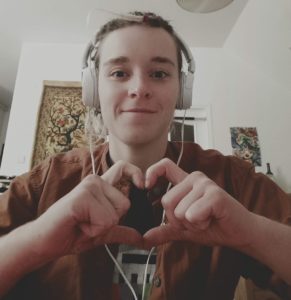
Anne Neijens adjusts to online learning
“All the basic tests are performed in tents next to the hospital,” she said. “There was a blood test, my blood oxygen level was checked, X-rays of the lungs were taken, and my temperature was measured, the oxygen level was good enough to go home, but I had the sickness. For me there was no real threat, so they didn’t really care. I just have to stick to the quarantine.
Most international students are young and healthy enough to find themselves in the least at-risk group of the general population. However, since the pandemic’s spread to Poland many have been forced to grapple with interruptions to their lives greater, perhaps, than many others.
Dr Czerska-Shaw says that administrators need to be aware that “they may be experiencing higher levels of stress and anxiety due to being socially isolated in a state of emergency, and on top of that in a foreign country”. She and her colleagues have been opening up one-on-one “online office hours” and drop in cafes to keep in touch with these students, and luckily the university has a student adaptation and support centre that offers professional counselling (now via telephone or skype), also to international students”.
Her colleague Duszan Augustyn discovered that the number to call for people with symptoms of the virus did not work for foreign mobile phone numbers. After his intervention, the ministry quickly set up an extra number which everybody could get through to.
Though universities have been quick to institute online learning, many students fear that COVID-19 will delay their degrees. Poland’s level of emergency preparedness and quality of healthcare were not the first things on most international students’ minds when they decided to pursue studies in the country. As the pandemic lays bare the vulnerabilities in the globalised system of travel and education, however, it has forced them to take a new perspective.
Main image credit: Adam Schorin

Percy Metcalfe is an American Fulbright student located in Warsaw for the academic year of 2019/20. He is carrying out a research project on the performance of national identity in the Polish-U.S. bilateral relationship at the University of Warsaw while also working part time for Notes from Poland.
